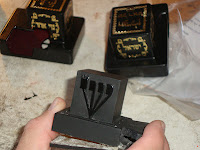Are we bound to Ashkenazi custom concerning Kitniyot?
Question:
My family made Aliyah from the States in August 2006. We are Ashkenazim. The following Pesach I asked the Rav of our Yishuv if we could eat Kitniyot as taking on the custom of Eretz Yisrael etc. and he said no. Are we bound by this answer and is there a way to change our minhag? I feel strongly about this issue.
Answer:
The system whereby Rabbanim become the Rav of a Yishuv/town/city in Israel is a political and bureaucratic process which, in my view, is neither Halakhically valid nor binding. See Rambam, Mishne Tora, Sanhedrin 2:11 (Vilna edition: 8). Even if this were not the case, a Rav is appointed Rav of the Yishuv and communal issues fall within his purview; one is not required to accept the Yishuv's Rav as one's personal Rav.
The Mishna (Avoth 1:6, 1:15) states: "'Asse l'kha Rav", i.e. choose a Rav and follow him. Similarly, the Talmudh ('Eruvin 6b) states that one should not always seek out the lenient opinion, and one who does so is deemed a "rasha" (a sinner). A Jew should choose a Rav and/or system and implement that choice with intellectual honesty and consistency.
Having researched the issue of Qitniyoth on Pesah extensively, it is quite plain to me that this custom was originally based on the mistaken notion that foodstuffs such as rice, beans etc., like the five species of grains (essentially wheat and barley), can become Hametz. This position, which stands in direct contradiction to the Mishna, the Talmudh and universal Jewish practice until its appearance in France in the 13th century, was so problematic that alternate explanations were suggested (wheat and rice being packed in the same sacks, being difficult to tell apart when ground into flour etc.)
The facts, however, are otherwise: qitniyoth were considered a secondary form of Hametz, as stated explicitly in several medieval sources. It follows that this custom is based on an error, believing something to be assur when in fact it is mutar. Several Rishonim describe this custom as “foolish” (e.g. Rabbenu Yeruham quoted by Beth Yoseph OH 453) and “extreme” (Tur ad loc). The fact that many Karaites consider anything fermented to be Hametz (e.g. yoghurt) and all items that can ferment as possible sources of Hamess raises the possibility that this custom has its roots in Karaite Judaism.
A custom based on error does not have the legal standing of a valid minhagh, and can therefore be undone. See Yerushalmi P’sahim 4:1 and Rambam, Mishne Tora, Isure Biya 11:13-14 (or 14-15). As pointed out by the Ya’abess (R. Ya’aqov Emden), a custom based on error can simply be dropped.
This minhagh has been extended over time to include many items that cannot be defined as qitniyoth, e.g. peanuts. HaGaon Rav Shaul Yisraeli z”l said to me exactly 27 years ago that in his Russian home town of Slutzk peanuts were not only consumed during Pesah but were placed on the table when guests arrived. He mentioned that this was done in the home of HaGaon Rav Isser Zalman Melzer z”l, the Rav of Slutzk and later Rosh Yeshiva of Yeshivath ‘Ess Hayim in Jerusalem. 45 years ago all Ashkenazim in North America used peanut oil during Pesah; today it has mysteriously become qitniyoth.
This minhagh has further been extended to oil and qitniyoth derivatives (e.g. lecithin). This is beyond extreme. HaGaon Rav Dov Lior Sh’litta has published his opinion in writing that qitniyoth derivatives may be consumed on Pesah.
Due to all the foregoing, I believe that you and your family may consume qitniyoth on Pesah.
It is my considered opinion that this issue constitutes a litmus test of our aspirations and commitment to laying the foundations for a more authentic and meaningful Tora Judaism for ourselves, our children and for future generations.
Hagh Sameah
Rabbi David Bar-Hayim
Machon Shilo
www.machonshilo.org
My family made Aliyah from the States in August 2006. We are Ashkenazim. The following Pesach I asked the Rav of our Yishuv if we could eat Kitniyot as taking on the custom of Eretz Yisrael etc. and he said no. Are we bound by this answer and is there a way to change our minhag? I feel strongly about this issue.
Answer:
The system whereby Rabbanim become the Rav of a Yishuv/town/city in Israel is a political and bureaucratic process which, in my view, is neither Halakhically valid nor binding. See Rambam, Mishne Tora, Sanhedrin 2:11 (Vilna edition: 8). Even if this were not the case, a Rav is appointed Rav of the Yishuv and communal issues fall within his purview; one is not required to accept the Yishuv's Rav as one's personal Rav.
The Mishna (Avoth 1:6, 1:15) states: "'Asse l'kha Rav", i.e. choose a Rav and follow him. Similarly, the Talmudh ('Eruvin 6b) states that one should not always seek out the lenient opinion, and one who does so is deemed a "rasha" (a sinner). A Jew should choose a Rav and/or system and implement that choice with intellectual honesty and consistency.
Having researched the issue of Qitniyoth on Pesah extensively, it is quite plain to me that this custom was originally based on the mistaken notion that foodstuffs such as rice, beans etc., like the five species of grains (essentially wheat and barley), can become Hametz. This position, which stands in direct contradiction to the Mishna, the Talmudh and universal Jewish practice until its appearance in France in the 13th century, was so problematic that alternate explanations were suggested (wheat and rice being packed in the same sacks, being difficult to tell apart when ground into flour etc.)
The facts, however, are otherwise: qitniyoth were considered a secondary form of Hametz, as stated explicitly in several medieval sources. It follows that this custom is based on an error, believing something to be assur when in fact it is mutar. Several Rishonim describe this custom as “foolish” (e.g. Rabbenu Yeruham quoted by Beth Yoseph OH 453) and “extreme” (Tur ad loc). The fact that many Karaites consider anything fermented to be Hametz (e.g. yoghurt) and all items that can ferment as possible sources of Hamess raises the possibility that this custom has its roots in Karaite Judaism.
A custom based on error does not have the legal standing of a valid minhagh, and can therefore be undone. See Yerushalmi P’sahim 4:1 and Rambam, Mishne Tora, Isure Biya 11:13-14 (or 14-15). As pointed out by the Ya’abess (R. Ya’aqov Emden), a custom based on error can simply be dropped.
This minhagh has been extended over time to include many items that cannot be defined as qitniyoth, e.g. peanuts. HaGaon Rav Shaul Yisraeli z”l said to me exactly 27 years ago that in his Russian home town of Slutzk peanuts were not only consumed during Pesah but were placed on the table when guests arrived. He mentioned that this was done in the home of HaGaon Rav Isser Zalman Melzer z”l, the Rav of Slutzk and later Rosh Yeshiva of Yeshivath ‘Ess Hayim in Jerusalem. 45 years ago all Ashkenazim in North America used peanut oil during Pesah; today it has mysteriously become qitniyoth.
This minhagh has further been extended to oil and qitniyoth derivatives (e.g. lecithin). This is beyond extreme. HaGaon Rav Dov Lior Sh’litta has published his opinion in writing that qitniyoth derivatives may be consumed on Pesah.
Due to all the foregoing, I believe that you and your family may consume qitniyoth on Pesah.
It is my considered opinion that this issue constitutes a litmus test of our aspirations and commitment to laying the foundations for a more authentic and meaningful Tora Judaism for ourselves, our children and for future generations.
Hagh Sameah
Rabbi David Bar-Hayim
Machon Shilo
www.machonshilo.org



Comments